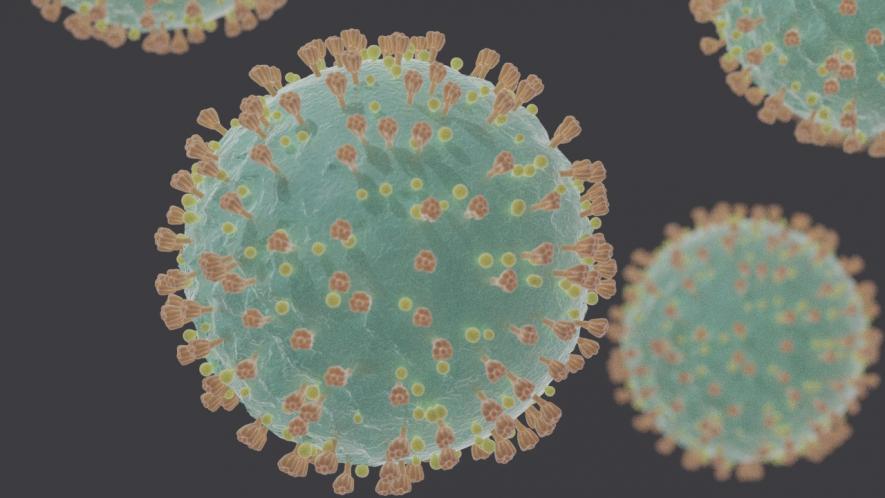Research Hints Genetic Linkage to Long COVID

Image Courtesy: Wikimedia Commons
COVID-19 may no longer be so panic now as it was two years back, but researchers have not stopped intriguing into different aspects of the disease and the coronavirus that caused the pandemic. One such aspect was to find whether there exists some genetic linkage with the disease, especially with the condition known as long COVID. This means that researchers want to examine why some people develop the condition of long COVID and whether their genetics has to play a role in it.
In a recent research that appeared in the preprint server medRXiv, researchers claimed to have found such a relation. It says that a DNA segment near a gene named FOX4P may be responsible. This gene is active in the lungs and in some immune cells. The research analysed the data from 6,450 people from 16 countries who were reported to have developed long COVID conditions.
What is long COVID? The World Health Organisation (WHO) defines it as a continuation of symptoms or development of new symptoms three months after the initial infection by SARS-CoV-2, the coronavirus that causes COVID-19. By now, almost all of us know what symptoms COVID-19 can ignite. But, in the case of long COVID, those initial symptoms linger for long. There can be as many as 200 different symptoms among patients with long COVID, which can impact day-to-day life.
In the recent preprint research, the researchers were co-led by Hugo Zeberg, a geneticist at the Karolinska Institute in Stockholm, Sweden. The team analysed data from 24 previous studies of about 6500 patients diagnosed with long COVID symptoms. The team also considered over a million other patients as controls, meaning they did not have long COVID symptoms.
In such studies, a comparison is made in two large samples, one representing the condition of interest (here, long COVID) and the other without the condition. Suppose some trait is observed among those having the condition which is absent among those without the condition. In that case, an inference is drawn that the particular trait is responsible for the condition. The researchers of the preprint paper analysed whether some particular genetic trait is present amongst the 6,500 long COVID patients, which is absent without the condition.
In an analysis carried out by the team of researchers in 11 of the 24 studies considered, they found a particular segment of the DNA associated with about one-and-a-half-fold higher odds of developing long COVID. That DNA segment was found near the gene named FOX4P. This gene is active in the lungs and other immune cells. The segment is also associated with a higher level of expression of the FOX4P gene in lung cells.
The same gene was found to be linked to severe COVID-19 conditions in previous studies. Importantly, severe COVID conditions may be linked to long COVID, but the gene has a different degree of impact on developing long COVID. Zeberg, in his comment in a Nature article about the research by Ledford's team, said, "This variant has a much stronger impact on long COVID than its impact on severity."
Worth remembering at this point that genes are those portions of the DNA which guide the production of proteins. The DNA is like a long thread consisting of four bases denoted by alphabets A, T, C and G. These letters appear in various combinations forming the long thread of the DNA. A representative example can be thought of as below.
Suppose a DNA is like—
'ATCGCGATCAGTACGATACGATACGATTACCAGGACGATGGCATAG'. In this DNA, genes are made up of some segments, like a gene may be ATCGCG or GCGA or TACG.
Researchers can find genes from the entire DNA sequence and then find the link of such genes to a particular disease condition or susceptibility of an individual to develop a particular disease when a gene is expressed at a higher level.
Zeberg and his team's findings are welcomed by other experts in the field, but not without critical observations.
Zhongshan Cheng, a bioinformatician at St. Jude Children's Research Hospital, Tennessee, USA, said, "Replicating that finding in other data sets would help to strengthen the study's conclusions".
He added, "Many of the data used in the long-COVID analysis were also used in the analysis that found a link between FOX4P and severe COVID-19."
"Fresh data would help to rule out the possibility that other factors, such as lung cancer, could have influenced the apparent association with FOX4P," Cheng opined. Notably, FOX4P is also found to be associated with lung cancer, which is the basis of Cheng's concern.
Get the latest reports & analysis with people's perspective on Protests, movements & deep analytical videos, discussions of the current affairs in your Telegram app. Subscribe to NewsClick's Telegram channel & get Real-Time updates on stories, as they get published on our website.





















